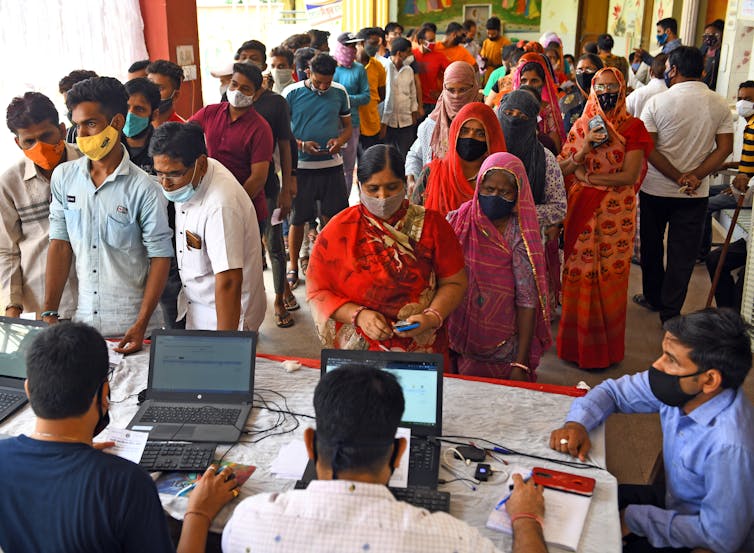how the US manipulates global markets for economic supremacy
- Written by Jostein Hauge, Assistant Professor in Development Studies, University of Cambridge

US president, Joe Biden, raised tariffs on Chinese-made goods sharply in May, claiming[1] that the “Chinese government has cheated by pouring money into Chinese companies … hurting competitors who play by the rules”. The tariffs[2] are 25% on steel and aluminium, 50% on semiconductors and solar panels, and 100% on electric vehicles.
Under Biden’s presidency the US has embarked on an ambitious strategy to revive American high-tech industries and become less reliant on foreign imports, especially from China. This strategy has included pumping massive subsidies[3] into the renewables and semiconductor industries. The tariff hikes are clearly part of this strategy and shouldn’t come as a surprise to those who have followed US trade and industrial policy in recent years.
But the double standards of these policies, particularly the recent tariffs, need to be addressed. For years, Democratic and Republican administrations in the US have touted the virtues of free trade to the rest of the world, working towards establishing a multilateral trading system that limits the use of protectionist policies.
The formation of the World Trade Organization (WTO) is a great example of this. During the years of negotiations in the 1980s and 1990s that led to the formation of the WTO, a small group of powerful countries – led by the US and influenced by large corporations based in the US – used their power and influence to rewrite the rules[4] of international trade to their advantage.
The system they established was publicly marketed as a system of “fair play” in the global economy that would benefit all countries that took part in it. However, in reality, WTO rules clearly made it easier for US-based corporations to expand their dominance in the world economy. Limiting protectionism, especially in developing countries, has enabled US-based corporations to grow their control.
The income that US-based transnational corporations have collected from their foreign affiliates, measured as a share of their total worldwide net income, increased[6] from 17% in 1977 to 49% in 2006. And in 2010, Walmart, one of the world’s largest retail companies, ranked as China’s seventh-largest trading partner[7], ahead of the UK.
Even today, when the scales have balanced themselves slightly more in favour of China, the headquarters of the world’s largest companies are highly concentrated in the US.
The US has also used the WTO framework to prop up the profits of US-based pharmaceutical companies, preventing lifesaving vaccines from reaching developing countries in the process. The pandemic provided the clearest example of this.
In early 2021, there was a big debate[8] between WTO member states about whether patents on COVID vaccines should be waived. WTO rules protect patents and copyrights globally under the guise of incentivising more innovation.
The irony with this rule is that it doesn’t support the free flow of technological knowledge, in some ways contradicting the mantra of free trade. But the rule is consistent with how the WTO works in practice, in that it serves to protect the interests of US-based corporations.
The way this works is simple. On paper, WTO rules seek to protect everyone’s intellectual property. But, because innovation is highly skewed globally, these rules give a massive advantage to large companies in wealthy countries who have superior research and development infrastructure and de-facto monopolies on intellectual property.
The argument for waiving the patents was that during a global pandemic, it would be inhumane and greedy to prevent developing countries from being able to access the best vaccine recipes.
What was the outcome of this debate? The US, along with a few more high-income countries, voted to block[9] the waiver on vaccine patents. This prevented many poorer countries from gaining access to the vaccine recipes of companies such as Pfizer.
Having had access to the recipes early on could have saved thousands of lives in these countries, especially in those with decent vaccine manufacturing capacity such as India. In fact, research[10] published in 2023 found that more than 50% of COVID deaths in low and middle-income countries could have been avoided if people had the same access to vaccines as wealthy states.
By hiking tariffs on Chinese-made goods, the US is once again trying to bend and change the rules of international trade to work in its favour. After working tirelessly to establish a system of free trade, the US is now making an 180-degree turn and has imposed some of the steepest tariffs we’ve seen by a major economy in recent years.
US trade policy has always been about protecting the interest of US-based corporations, so this should not come as a surprise. But the hypocrisy of Biden’s administration needs to be called out.
In the rules-based multilateral trading system of today, China has not entirely played[12] by the rules either. But China hasn’t come close to trying to change the rules to work in their favour as much as the US. So, who’s really cheating here?
References
- ^ claiming (x.com)
- ^ tariffs (www.theguardian.com)
- ^ massive subsidies (www.nytimes.com)
- ^ rewrite the rules (www.wiley.com)
- ^ Jim Lo Scalzo / EPA (epaimages.com)
- ^ increased (academic.oup.com)
- ^ seventh-largest trading partner (www.theguardian.com)
- ^ big debate (academic.oup.com)
- ^ voted to block (the.ink)
- ^ research (www.nature.com)
- ^ Sumit Saraswat/Shutterstock (www.shutterstock.com)
- ^ not entirely played (www.csis.org)







